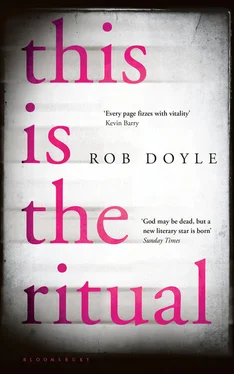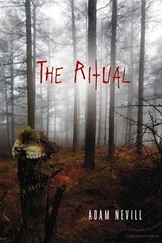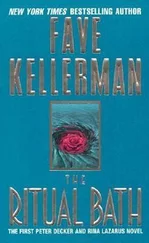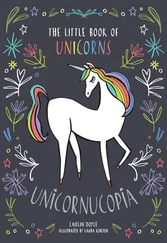Rob Doyle - This is the Ritual
Здесь есть возможность читать онлайн «Rob Doyle - This is the Ritual» весь текст электронной книги совершенно бесплатно (целиком полную версию без сокращений). В некоторых случаях можно слушать аудио, скачать через торрент в формате fb2 и присутствует краткое содержание. Год выпуска: 2016, Издательство: Bloomsbury Publishing, Жанр: Современная проза, на английском языке. Описание произведения, (предисловие) а так же отзывы посетителей доступны на портале библиотеки ЛибКат.
- Название:This is the Ritual
- Автор:
- Издательство:Bloomsbury Publishing
- Жанр:
- Год:2016
- ISBN:нет данных
- Рейтинг книги:5 / 5. Голосов: 1
-
Избранное:Добавить в избранное
- Отзывы:
-
Ваша оценка:
- 100
- 1
- 2
- 3
- 4
- 5
This is the Ritual: краткое содержание, описание и аннотация
Предлагаем к чтению аннотацию, описание, краткое содержание или предисловие (зависит от того, что написал сам автор книги «This is the Ritual»). Если вы не нашли необходимую информацию о книге — напишите в комментариях, мы постараемся отыскать её.
This is the Ritual — читать онлайн бесплатно полную книгу (весь текст) целиком
Ниже представлен текст книги, разбитый по страницам. Система сохранения места последней прочитанной страницы, позволяет с удобством читать онлайн бесплатно книгу «This is the Ritual», без необходимости каждый раз заново искать на чём Вы остановились. Поставьте закладку, и сможете в любой момент перейти на страницу, на которой закончили чтение.
Интервал:
Закладка:
Born into an upper-middle-class family in Dalkey, County Dublin, in 1948, Turner only began writing with any seriousness in his early twenties. 3It may be that Turner was prevented from writing as a younger man by the unhappiness of his home life. Maureen Turner, Killian’s mother, died after complications resulting from the birth of her only child. Killian’s father, Henry, was a history teacher in a private secondary school in Dalkey, and a man of trenchantly melancholy disposition. In the smog-choked winter evenings of Killian’s boyhood and adolescence, Henry would call his son into his study. There, as Killian stood silently by his side, the father would issue sweeping utterances about the destruction inherent in the very cells of civilisation, the transience of mankind, and the utter folly of all our humanistic dreams of progress, peace and salvation. The cold gaze of scientific comprehension, declared father to son, betrays the appalling truth of our place in the universe as an accidental and fear-crazed species, rubbing its bleary eyes to find itself perched aboard a rock that hurtles through black infinities, whose only destiny is to be swallowed up once more in the great darkness. Religion, morality, truth, human solidarity — these are nothing, proclaimed the father, but the consoling fictions bred by our proximity to the abyss and the panic it engenders.
It can only be imagined what impression these dark lessons had on the sensitive young Killian. What we can be sure of, however, is that the great, seismic event of Turner’s youth was the suicide by poisoning of Henry Turner at the age of fifty-three, when Killian was eighteen. This event, reappearing in various guises, is the black hole, the vortex of destructive fury around which Turner’s writing orbits, drawing ever closer, inviting — and this is what gives the experience of reading Turner what has been called its ‘vertiginous’, ‘abyssal’ quality — a kind of cosmic-orgasmic catastrophe in the psyche of both reader and writer.
Until the death of his father, Turner seems to have been a rather normal child and young man. He enjoyed hurling, soccer and Gaelic football. His schoolmates and friends remembered him as being quiet, but devastatingly witty when called upon to use his wit as a weapon, and gently hilarious when among friendlier company. He was something of a loner by disposition, yet not unpopular. Beginning in early childhood, Turner read voraciously. In his teens he had a colossal appetite for science fiction and so-called ‘weird’ fiction (his fascination with the work of H. P. Lovecraft bordered on the religious: the young Turner would spend whole weekends in his room, drawing wildly imaginative pictures of the Old Ones of Lovecraftian mythology. Not infrequently, his father and any visitors to the household would be startled by sudden, bellowed recitals, issuing from Killian’s bedroom, of the incantations of savage tribes to their hellish gods familiar to readers of Lovecraft’s stories: Ph’nglui mglw’nafh Cthulhu R’lyeh wgah’nagl fhtagn! ).
In his late teens and early twenties, Turner lived on the inheritance he had received upon his father’s death. He did not pursue third-level studies, though he did continue to read as much, and more widely than ever, nourishing keen interests in mythology, anthropology and avant-garde physics. It was during this period that Turner began to imagine he could become a writer. At the age of twenty-five, having published two short stories and several reviews in various Irish journals and newspapers, he set to work on his first novel. Edge of Voices took four years to complete, and a further two to find a publisher, finally seeing print when its author was thirty-one. Regarded from its first appearance as one of the true oddities of Irish literature (a literature hardly scarce of oddities), the novel is equal parts semi-autobiographical portrayal of an unremarkable Dublin adolescence, and fantastical, eerie missive from the furthermost extremes of human experience. The story, such as it is, tells of a boy, Michael Kavanagh, similar in most ways to Turner, who, on the day of his Catholic confirmation, begins to receive, or believe he is receiving, telepathic messages from a hyper-intelligent presence, perhaps extraterrestrial or inter-dimensional in origin, which may once have inhabited the earth in corporeal form, but now exists only as an imperceptible atmospheric layer. Michael is deeply troubled by the messages, often doubting his own sanity. Yet he continues to live his outward life more or less as usual, enduring the timeless trials of adolescence and winning local renown as a full-back on the under-17 Gaelic football team. Then, after Michael reaches his eighteenth birthday, loses his virginity (in what must rank as one of the most hilarious love scenes in Irish fiction) and applies to study European History at Trinity College, all in the same bittersweet week, the transmissions abruptly cease, never to resume. The final sixty pages of the book are given over to an exegesis, supposedly set down in the fourth millennium AD, of the messages received by Michael over a three-year period during his adolescence. The implication seems to be that Michael has become some sort of messiah, or the founder of a new religion or civilisation.
Edge of Voices was first published not in Ireland but in France, and then in New York, by small independent presses committed to the literary heterodox. Turner gave several readings in Paris, where he gained minor cult status. Then, when he was thirty-three, he received an Irish Arts Council bursary, which he used to fund a trip around Europe. He travelled for three months, filling several notebooks with reflections on post-war Europe that were to inform his work for years to come. Instead of returning to Ireland after his travels, Turner settled in West Berlin, where he was to remain for the final three years prior to his disappearance.
Throughout the early eighties, from the anarchist and bohemian neighbourhood of Friedrichshain he had made his home, Turner continued to send stories, essays and other, increasingly uncategorisable writings almost exclusively to Irish journals, as if still engaged in a dialogue with a land he had otherwise repudiated. (By no means were all of these pieces accepted for publication.) Turner rented a small apartment in a block largely occupied by political radicals and artists, and seemed to thrive in this environment. The poet Sarah Flanagan, who also lived in Berlin around this time and befriended Turner, later remarked that his apartment had something of the monk’s cell to it. ‘There was a stove, a pot, a pan, a few cups and plates, a desk, and a bed. Apart from that, the only things he had were books,’ she said. Asked about Turner’s social and romantic life in this period, she replied: ‘I don’t know what to say about that. I mean, for sure he was handsome, and he had a certain charisma. But there was a. . a kind of privacy to him that went beyond simple introspectiveness. Like he would only let you come so far, and then he’d step out into the grounds of the castle to meet with you. He was never unfriendly, never cold. But there was a boundary. I used to wonder about his love life. He never told me about it, and when I asked he was always wittily evasive. Later, of course, there were all the rumours, but I didn’t know him any more by that stage. . I used to tell him he looked like Michel Foucault, with the bald head, the intense eyes, the glasses. He liked that. He rarely laughed, but he had a lively, faint kind of smile. I remember that.’
Living within sight of the Berlin Wall, steeped in the atmosphere of what he called ‘the city on earth that has come closest to the core of the darkness, hearing the very beat of the devil’s wing’, Turner’s lifelong fascination with Nazi Germany, the Holocaust and the Second World War found endless stimulation. He took long, aimless walks through the city, at all times of day or night, overcome with visions of the enormity that had been perpetrated there mere decades ago. Reading deeply from the literature of the war, Turner developed what he described as a ‘merciless obsession’ with Hitler’s plan, devised during the height of the Third Reich’s reach and ambition, to convert the island of Ireland into the ‘granary of Europe’ following the final triumph of Nazism. Turner’s second book, The Garden , was the controversial fruit of this obsession.
Читать дальшеИнтервал:
Закладка:
Похожие книги на «This is the Ritual»
Представляем Вашему вниманию похожие книги на «This is the Ritual» списком для выбора. Мы отобрали схожую по названию и смыслу литературу в надежде предоставить читателям больше вариантов отыскать новые, интересные, ещё непрочитанные произведения.
Обсуждение, отзывы о книге «This is the Ritual» и просто собственные мнения читателей. Оставьте ваши комментарии, напишите, что Вы думаете о произведении, его смысле или главных героях. Укажите что конкретно понравилось, а что нет, и почему Вы так считаете.












